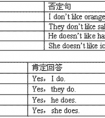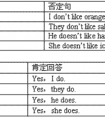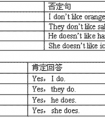根据要求改写句子。1. Yes, Icandothehousework.(对此句进行提问) 2. Mikecansweepthefloor.(改成否定句) 3. Herfavouritefoodisfish.(对划线部分提问)4. are forveg-五年级英语
May God bless you! 愿上帝保佑你!
He might be at home. 他可能在家。
注意:might 表示推测时,不表示时态,只是可能性比may 小。
2.成语:may/might as well,后面接不带to 的不定式,意为"不妨"。例如:
If that is the case, we may as well try.如果情况确实如此,我们不妨试一试。
比较have to和must:
1.两词都是“必须”的意思,have to 表示客观的需要,must 表示说话人主观上的看法,既主观上的必要。例如:
My brother was very ill, so I had to call the doctor in the middle of the night.
弟弟病得很厉害,我只得半夜里把医生请来。(客观上需要做这件事)
He said that they must work hard.
他说他们必须努力工作。(主观上要做这件事)
2.have to有人称、数、时态的变化,而must只有一种形式。但must 可用于间接引语中表示过去的必要或义务。例如:
He had to look after his sister yesterday. 他昨晚只得照顾他姐姐。
3.否定结构中:don't have to表示"不必",mustn't表示"禁止"。例如:
You don't have to tell him about it.你不一定要把此事告诉他。
You mustn't tell him about it.你不得把这件事告诉他。
比较shall和should:
1).shall 用于第一人称,征求对方的意见。
What shall we do this evening?
2).shall 用于第二、三人称,表示说话人给对方的命令、警告、允诺或威胁。
①. You shall fail if you don’t work hard.(警告)
②. He shall have the book when I finish it.(允诺)
③. He shall be punished.(威胁)
will和would的用法:
1.表示请求、建议等,would比will委婉客气。如:
Would you pass me the book?
2.表示意志、愿望和决心。如:
I will never do that again.
They asked if we would do that again.
3.用“will be”和“will(would) + have + 过去分词”的结构表示推测,主要用于第二、三人称。
前者表示对目前情况的推测,后者表示对已经完成的动作或事态的推测。如:
This will be the book you want.
He will have arrived by now.
The guests would have arrived by that time.
I thought you would have finished this by now.
4.will表示习惯、请求,固有性质等。
Everyday he will sit here hour after hour doing nothing.(习惯)
Will you help me with my English?(请求)
The door won't open. (固有性质)
5.Would可表示过去反复发生的动作或某种倾向。
Would表过去习惯时比used to正式,并没有“现已无此习惯”的含义。如:
The wound would not heal.
During the vacation he would visit me every week。
6.表料想或猜想。如:
It would be about ten when he left home.
What would she be doing there?
I thought he would have told you all about it.
情态动词用法口诀:
情态动词两特点,动词原形接后面,说话语气较委婉。
can"能力"may"许可",must"责任"或"义务"。
否定回答needn’t换,"需要"need,dare"敢"。
should"应该",would"愿",haveto"被迫"表客观。
can, could, may, might, must 皆可表示推测,其用法如下:
1)情态动词+动词原形,表示对现在或将来的情况的推测,此时动词通常为系动词。例如:
I don't know where she is,she may be in Wuhan.我不知道她在哪儿,可能在武汉。
2)情态动词+动词现在进行时,表示对现在或将来正在进行的情况进行推测。例如:
At this moment,our teacher must be correcting our exam papers.这时,想必我们老师正在批改试卷。
3)情态动词+动词完成时,表示对过去情况的推测。例如:
The road is wet.It must have rained last night.地是湿的,昨天晚上一定下雨了。
4)情态动词+动词的现在完成进行时,表示对过去正在发生事情的推测。例如:
Your mother must have been looking for you.你妈妈一定一直在找你。
5)推测的否定形式,疑问形式用can't,couldn't表示。例如:
Mike can't have found his car,for he came to work by bus this morning.
迈克一定还没有找回他的车,因为早上他是坐公共汽车来上班的。
注意:could,might表示推测时不表示时态,其推测的程度不如can,may。
考点名称:一般疑问句
- 一般疑问句:
是疑问句的一种。它是以be动词,have或助动词、情态动词开头,用yes(是)或no(否)来回答的句子。
其结构是:系动词be/助动词/情态动词+主语+其他成分
一般疑问句的肯定形式为:
助动词+主语(+实义动词)。肯定答语用“yes+可定结构”。
一般疑问句的否定形式为:
助动词构成的缩写否定词+主语(+实义动词)。否定答语用“no+否定结构”。
例:
— Do you like this story-book? 你喜欢这本故事书吗?
— Yes, I do. 喜欢。/ No, I don’t. 不喜欢。
— Is he a student? 他是一名学生吗?
— Yes, he is. 是,他是。/ No, he isn’t. 不,他不是。 一般疑问句的改写:
一、含有be动词的一般疑问句,通常把be动词调到句首。例如:
陈述句:They are in the swimming pool.
一般疑问句:Are they in the swimming pool?
注意:一般疑问句句末要用“?”。
二、含有情态动词的一般疑问句(can, may...),把情态动词调到句首。例如:
陈述句:He can drive a car.
一般疑问句: Can he drive a car?
三、含有have的一般疑问句,have译为“有”。一般疑问句式有两种形式:
1.把have/has调到句首。例如:
陈述句:Tommy has a computer.
一般疑问句:Has Tommy/he a computer?
2.加助动词do/does,第三人称单数用does,其他人称用do。其句型为:Do/Does + 主语 + have...?
例如上句可变为: Does Tommy have a computer?四、一般动词的一般疑问句,也要借助助动词do/does,第三人称单数用does,其余人称用do。
其句型为:Do/Does + 主语 + 动词原形+其它?
陈述句:Amy speaks English.
一般疑问句:Does Amy speak English?一般疑问句的回答:
首先要有人称的改变。当主语为名词时,在答语中要改成其相应的代词。
另外,答语有两种,肯定的回答(用yes)和否定的回答(用no),否定式常用缩写形式。
现在还是让我们分句型一一说明。一、一般疑问句含be动词时,用be动词回答,句末用句号。例如:
-Is Mary your sister?
-Yes, she is. / No, she isn’t.(缩写)二、一般疑问句含有情态动词(can, may, should等)时,用情态动词回答。例如:
-May I come in?
-Yes, you may. / No, you can’t.三、一般疑问句含有have(译为“有”)时,有两种回答方式。
1.直接用have/has回答。
例如:
-Have they any pictures?
-Yes, they have. / No, they haven’t.
2.用助动词do/does回答。
例如:
-Does Millie smoke?
-Yes, she does. / No, she doesn’t.四、一般动词的一般疑问句回答时也用助动词。
例如:
-Do the workers live in London?
-Yes, they do. / No, they don’t.
考点名称:特殊疑问句
- 特殊疑问句:
以特殊疑问词开头,对句中某一成分提问的句子叫特殊疑问句。
常用的疑问词有:what、who、whose、which、when、where、how、why等。
特殊疑问句往往是就其中的某一成分,进行提问,而且根据情况直接回答,不能用yes或no简单回答。
常见的疑问代词有who, whose, which, what;疑问副词有when, where, why, how。
例:What do you do on Sunday? 你周日的时候干什么?
Which class are you in? 你在哪个班?
Where does Mr. Li live? 李先生住在哪?
Why are you late? 你为什么迟到? 特殊疑问句的构成:
一、 特殊的疑问词。
特殊疑问句要由疑问代词或疑问副词开头,询问的内容不同, 使用的疑问词也不同。
我们学过的疑问词有:
what(询问事物), how much(询问价格),what time (询问时间,尤其是点钟), what kind of(询问种类),why(询问原因),who(询问人), where(询问地点) 等等。如:
—What is this? 这是什么?
—It's a key. 这是一把钥匙。
—How much is it? 这个多少钱?
—It's twenty dollars. 二十美元。
—What kind of movies do you like? 你喜欢哪一类型的电影?
—I like action movies. 我喜欢动作片。
二、特殊的语序。
特殊疑问句由疑问词开头,其构成是“疑问词 + 一般疑问句”。如:
What time is it? 现在几点钟?
- 最新内容
- 相关内容
- 网友推荐
- 图文推荐
| [家长教育] 孩子为什么会和父母感情疏离? (2019-07-14) |
| [教师分享] 给远方姐姐的一封信 (2018-11-07) |
| [教师分享] 伸缩门 (2018-11-07) |
| [教师分享] 回家乡 (2018-11-07) |
| [教师分享] 是风味也是人间 (2018-11-07) |
| [教师分享] 一句格言的启示 (2018-11-07) |
| [教师分享] 无规矩不成方圆 (2018-11-07) |
| [教师分享] 第十届全国教育名家论坛有感(二) (2018-11-07) |
| [教师分享] 贪玩的小狗 (2018-11-07) |
| [教师分享] 未命名文章 (2018-11-07) |



![—Can you swim?—Yes ,________[ ] A. I can'tB. I canC. I am-三年级英语](http://www.00-edu.com/d/file/ks/4/1/46/2019-08-24/smallae208768e77b392cb00a5a8a687f84961566582505.jpg)
![_____________ I see that toy panda? [ ]A. canB. mayC. May-五年级英语](http://www.00-edu.com/d/file/ks/4/1/46/2019-08-24/small440f55b4860d5c9b87889948786e71451566582371.jpg)

